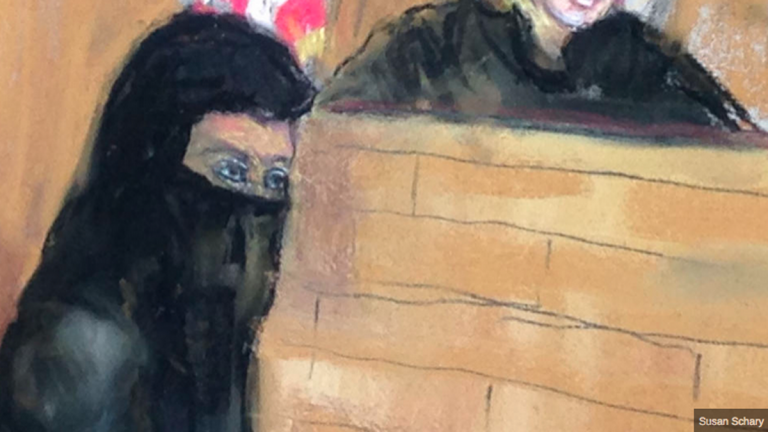Philadelphia woman sentenced to 8 years in prison for aiding ISIS

Keonna Thomas is depicted in Philadelphia's federal court in this artist's rendering. (NBC10, file)
A 33-year-old mother of two from North Philadelphia was sentenced Wednesday to eight years in federal prison for online support of the Islamic State and taking steps to join jihadist fighters in Syria.
Wearing a hijab and a gold-colored prison jumpsuit, Keonna Thomas told U.S. District Judge Michael Baylson she wanted to apologize to the court and her family.
“I’m not an evil or malicious person. I was, I guess, at one time, impressionable,” said Thomas, breaking her silence since her April 2015 arrest. “I know I put this country in danger, and I’m sorry and remorseful.”
Last September, Thomas, who went by “Young Lioness” on Twitter, pleaded guilty to one count of providing “material support” to terrorists. She had tweeted pro-ISIS messages, married a jihadist over Skype and obtained travel documents to travel to Syria.
In court on Wednesday, Kathleen Gaughan, a federal public defender, told the judge that Thomas has grappled with a long history of abuse and neglect. Her resulting depression sidelined her life and forced her to drop out of high school because she “just couldn’t be around people,” Gaughan said.
In recent years, Thomas found “a sense of belonging” on extremist Islamic websites “filled with promise of a utopian life,” Gaughan said. “She was searching for peace within herself, and she got severely lost.”
Although prosecutors point to Twitter messages as proof that Thomas had intended to martyr herself, Gaughan said Thomas really wanted to move to Syria to be a wife.
Still, Thomas “lost her way in a very, very real way,” Gaughan said. Given a recent post-traumatic stress disorder diagnosis, Thomas’ clean criminal history and the rehabilitation Thomas has completed in federal detention, Gaughan asked the judge for mercy.
U.S. Assistant Attorney Jennifer Arbittier Williams said while the turbulence of Thomas’ personal life and her lack of prior convictions were factors to consider, a serious punishment was necessary to deter any other Americans thinking about joining the Islamic State.
In 2013, Thomas told an overseas ISIS fighter that it “would be amazing” to die fighting for ISIS in attacks known as “martyrdom operations,” according to investigators.
Prosecutors say in another message she tweeted a photo of a young boy wearing firearm magazine pouches and camouflage with the caption: “Ask yourselves, while this young man is holding magazines for the Islamic State, what are you doing for it? #ISIS.”
She also tweeted that “I wouldn’t be pleased till I become a solider of the Islamic State.”
After the hearing, Williams said Thomas’ desire to becoming an Islamic State fighter went beyond shooting off messages on Twitter. Had it not been for FBI agents blocking her travel, Williams said, she may have gone overseas.
“Ms. Thomas did far more than tweet and retweet messages supporting ISIS,” Williams said. “Ms. Thomas obtained a passport. She obtained a visa. She researched secure travel routes to Syria and she was in direct contact with known violent jihadi fighters overseas.”
Both sides cited sentences, ranging from two to 15 years, that other defendants convicted of providing support to terrorists have faced in an effort to argue that Thomas’ penalty should be in line with past punishments.
The federal statute Thomas was charged under is a broadly worded law enacted as part of the Patriot Act passed after the 9/11 attacks. Critics have said it has been used aggressively in recent years to punish unpopular speech. Backers say it thwarts radically minded terrorists before it is too late.
After a long-winded discussion of sentencing guidelines and weighing both aggravating and mitigating factors, Baylson said the case was “troubling in many, many ways,” and that “the seriousness cannot be minimized.”
Thomas’ defense lawyers asked the judge for a five-year sentence; prosecutors pushed for a harsher sentence, arguing in court papers that the maximum punishment of 15 years behind bars was appropriate.
Baylson imposed a sentence of eight years in federal prison with 10 years of supervised released.
“There was obviously an absence of judgment in her psyche, and she needs substantial time to rehabilitate in a correctional facility,” Baylson said.
The more than two years Thomas has spent in federal detention will be applied to her sentence, meaning she will be imprisoned for another five years.
“Deterrence is key here,” Baylson said.
WHYY is your source for fact-based, in-depth journalism and information. As a nonprofit organization, we rely on financial support from readers like you. Please give today.




